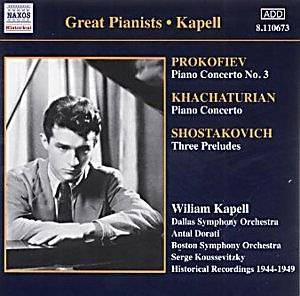William Kapell (1922-1953) was an incredibly gifted
young pianist whose life was cut short tragically in a plane crash at
the age of 31. But whereas certain artists who left us far too early,
Lipatti being the obvious example, and perhaps also Dino Ciani, have
become the stuff of legends, the name of Kapell tends to circulate,
at least in Europe, among the initiated. The programme of this disc
is hardly apt to show how he fared in music that requires more spiritual
qualities; but his sizzling fingerwork, his dash, and also his sense
of poetry, are revealed to be quite enough to justify a cult following.
The Prokofiev, often treated as a lightweight work,
a sort of modern Mendelssohn, has its temperament writ large. When it's
passionate it is searingly so, when it is brilliant it is dazzlingly
so, when it is poetic it is magically so. And the music thrives on such
extremes; it is an absolutely riveting performance which, in the last
resort, reveals the true stature of the music as few others do. Antal
Dorati is such a recent memory that it is strange to think that he was
already 43 when he conducted this; he backs Kapell with all the fiery
brilliance we know from his famous Mercury recordings of the 50s and
60s. Mark Obert-Thorn has opted, not for the first time, for a sound
which brings out as many upper frequencies as the original could reasonably
yield, making for a convincing presence of the piano at the expense
of some shrillness from the orchestra, particularly the upper strings.
Itís not an entirely pleasant sound but for students of great pianism
the main thing is that we get a good idea of Kapell himself.
The brief Shostakovich Preludes find Kapell penetrating
the composerís sad poetry as well as his irony and his brilliance. The
Khachaturian became particularly associated with him, though he later
dropped it from his repertoire. I found myself divided between admiration
for the fiery virtuosity of the performance and a real difficulty in
remaining concentrated on such mind-numbingly stupid music. This piece
enjoyed quite a vogue in its day; if a hundred years from now there
is the same taste for "interesting revivals" that characterises
todayís discographic output, I should hate to think of some well-meaning
glutton for punishment dredging this up from deserved oblivion. Except,
I suppose, that a recording which shows off pianism like this will ensure
the work a degree of immortality. However, I looked out for curiosity
a tape of a performance given in Turin in 1963 under the composerís
direction with Sergio Perticaroli as soloist. While Perticaroli had
not the devilish fingers of Kapell and the Turin RAI SO was emphatically
not the Boston SO, there is an easy, unemphatic musicality about the
performance which renders the music considerably more attractive, quite
bearable in fact. There is a doggedness about much of the first movement
which seems to stem in the first place from Koussevitsky, whereas Khachaturian
himself gets the orchestra to play with more swing. Kapell may be very
"imaginative" in his almost neurotic underlining of the composerís
counterpoints and counter-melodies in the more lyrical sections, yet
Perticaroliís straightforward concentration on the melodic line leaves
a more sympathetic impression. Matters are clinched at the opening of
the finale, hard-hitting from Kapell and Koussevitsky, frothy, like
a Russian Saint-Saëns, from Perticaroli and Khachaturian. The point
seems to be that Kapellís larger than life approach can be revelatory
when the material is strong, as in the Prokofiev, but risks thrashing
the daylights out of Khachaturianís more fragile plant.
Still, Kapell was an extraordinarily gifted pianist
and if you donít know his playing you should lose no time in doing so.
Indeed, at the Naxos price you might guarantee yourself many fascinating
hours by getting both this disc and that of Prokofievís own performance
of the 3rd concerto.
Christopher Howell


